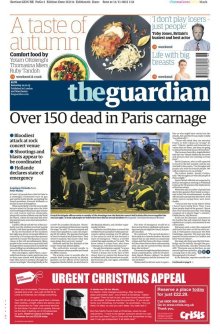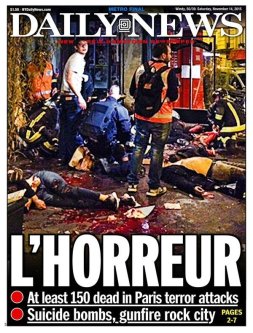November 13. Rival nations — France and Germany — come together for a friendly soccer match in Paris. Nineteen minutes fly by as fans’ cheers fill the packed stadium. But a deafening sound rings out above all else…
At 9:20 p.m. local time, the first suicide bomber went off. At 9:30, the second; at 9:53, the third bomber exploded outside the stadium. Within the next half hour, five more attacks took place all over Paris.
In less than 35 minutes, 129 lives were taken. Paris experienced its worst attack since WWII.
News outlets all over the world covered the events. Almost all major outlets for the Western world produced cover stories overnight (worth noting: many papers printed stories with incorrect data).
In the following days, news outlets continued to cover the Paris attacks as several stories came out: ISIS claimed responsibility for the attacks the next day in a video, details about the attack suspects were released, and the names of the 129 victims were memorialized.
However, seven days after the attack, mass coverage came to a halt in the United States (U.S.). How is it that a calculated terrorist attack by the world’s biggest terrorist threat receive little more than a weeks worth of attention?
After reading several articles from major outlets in the U.S. in the weeks following the Paris attack, and recalling my experience with it, I have identified four possible reasons for this.
1. Overwhelming Information
As shown in the two cover pages above, news outlets will always get the story out as soon as humanly possible. However a problem that undoubtedly arises with this approach is a crossroads of deciding to print with small verified information or waiting to print till more sufficient and concrete data is available. Unfortunately, as this Huffington Post article displays, many choose the former. Journalistic ethics are seemingly lowered in order to be the first outlet with the story. From a business standpoint though, it makes sense — let’s say, hypothetically, a person is on Twitter and receives a notification from The New York Times (NYT) late Saturday night about the Paris attack, that person is more likely to stay with NYT as the story unfolds than check other news outlets. So, with that in mind from the get-go, NYT will put out whatever they have to grab their initial audience, then as more information comes out they correct their mistakes and carry on. Ethics aside, I believe this approach to breaking news negatively affects the longevity of a story’s presence in the news. Outlets compete with each other to grab audiences, claiming to offer the newest nugget of information about the story. This creates an environment where readers do not need to remain loyal to one outlet, rather they can gather information as quickly as they want and can move on with their day. Which brings me to my next point:
3. Social Media
Social media is a hotbed for complacency. By tweeting a special hashtag like #prayforparis or adding a filter to your Facebook profile photo you can show your support for the city. People feel like a part of the community supporting Paris, but more truthfully it lets them off the hook — for lack of better words. It is a way for someone to publicly say “this tweet (or new profile picture) is my public declaration of support for Paris” and then wash their hands of the issue. This disconnected approach to support acts like a period — or end — to a person’s efforts to continue learning more of the story and cuts off future support because I think people deceive themselves into thinking they have done their part, but really they did nothing. Especially for people not affected by the event. Since we are in the U.S., we may feel empathy for our fellow man, but distance from the event makes it difficult to sustain a personal interest in a story.
2. Proximity
Whether it is the attack in Paris or the earthquake in Japan, proximity matters for the newsworthiness of a story. Because of our lack of connection as a country to the attacks in Paris and the plethora of events taking place here, it is natural for the Paris story to fade away. Now, there are two ways to look at this: one is a response of criticism of media and culture while another is to understand the nature of news.
4. Nature of news
News is fluid in nature — and there is nothing intrinsically negative about this fact. Important events are taking place everyday in the U.S., and news adjusts accordingly to keep audiences up-to-date with the latest happenings. With social media offering instant updates, and our interest in the U.S.’s current affairs, it is natural for stories to stay focused on things here.
In conclusion, I think it is important to note that just because the Paris story has moved away from the national spotlight, it does not make it less important. Lives were lost — and that is something that cannot be taken lightly. It will take time and help from people, not news outlets, for healing to take place. In fact, as the push to help Paris lessens, I would argue the real test for authentic support comes in the following weeks. Challenge yourself to move beyond a hashtag or a profile picture filter. There are still several ways to get involved.
News informs you, now it is up to you do something about it.


Aaron, a very creative headline, and an enjoyable read on this essay. Hey WHERE IS THE MBE #2? That essay has to be in (one form or another) by midnight tonight (Friday 18th). I still haven’t seen it and I very much want to read it. Remember, not turning it in is a loss of points. – Prof. Simon
LikeLike